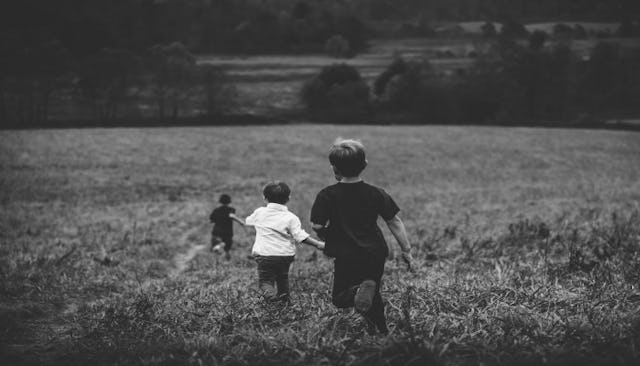Yes, My Kids Play Unsupervised, And No, You Should Not Call The Cops

I am sitting on the front porch, typing and ignoring my kids (ages 2, 4, and 6) who are playing some elaborate game involving worms, the hose, and a plastic toy wheelbarrow. I run out of iced tea. I cannot write without caffeine at hand, so I open the front door and go inside. I leave my three sons out there with the hose and their imaginations.
Yes, my kids play unsupervised. My front yard is fenced, with a gate across the driveway. The baby will not sprint into the road. They know their limits, to stay in the yard and not talk to people they don’t know. My oldest knows he is responsible for the behavior of the others, and that they all need to act kindly toward each other and share whatever they’re playing with (always the hose). So, no, you don’t need to call the cops. They know what they’re doing — especially for the eight minutes it takes me to brew tea with some peeks out the window to check on them.
I believe in unsupervised play. I believe I should just open the backdoor and let them out — which I do, and which I do frequently. The kids know to stay out of the shed (more because of black widows than power tools). They know not to throw hard projectiles at one another, and not to dig holes in unauthorized areas (yes, there are authorized areas for hole digging). They know they can’t use the hose unless I say so. My 6-year-old avoids bees because he’s allergic, and they all know that if he’s stung, they need to keep calm and find me immediately. The most dangerous thing out there? The mosquitoes, which probably carry West Nile.
Scratch that. The most dangerous thing out there is you, nosy neighbor. I don’t worry about my kids. I worry about the cops coming to interrogate my kids. Even with my kids playing in my privacy-fenced backyard, I worry about that knock on the door and the gold badge flashed in my face. I worry about the barrage of questions: “Why are the kids playing outside alone? Why are they home on a school day? Can I come inside?”
They’re playing outside alone because that’s what kids do. That’s what I did. My grandmother kicked us out the backdoor, despite a concrete back porch, and let us do our thing for as long as we could possibly muster it. Once we reached 7, we were allowed to go to the park across the street as long as she stayed on the front porch. I was alone at a park with swings and a metal slide and a metal jungle gym and a metal seesaw at age 7. Well, except I wasn’t alone: I also had my 5-year-old sister with me. I was deemed old enough to make sure she didn’t kill herself on the swings.
My almost 7-year-old and almost 5-year-old could never go to the park alone. I wouldn’t worry about them though. They always go to the park with me and with other moms, which means I’m talking to the other moms, which means they’re effectively unsupervised anyway. They know not to throw sand, snatch buckets, fling pinecones, or leap off the top of plastic play structures made safe for everything but that. They know not to leave the park or go deep in the bushes too close to the road. They’re fine.
I worry instead about the good Samaritans who think, Hark! A child alone is a child in danger! I must alert the proper authorities! Then they try to talk to my kids, who are probably freaked out that a strange adult — what I warned them about — is talking to them. The adult will sit and watch them (another thing I’ve warned them about) until the police show up. By then, my kids would be too rattled to explain the “free-range kids” concept to them, and I’d get a call from social services — who have better things to do, by the way, than interfere with my sons and their pampered home-schooled lifestyle.
[free_ebook]
So leave them alone. They’re safe. They know what they’re doing. The oldest one is almost 7, after all. They have more important things to do than deal with your worrying or a cop’s questions.
They’re children, and their job is to play, so move along.
This article was originally published on